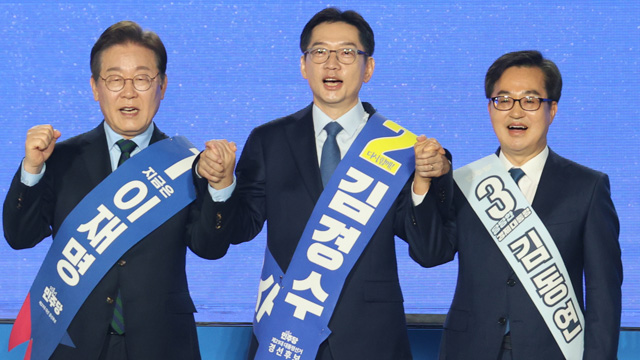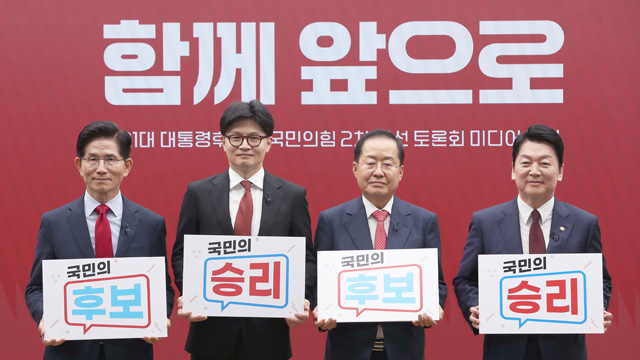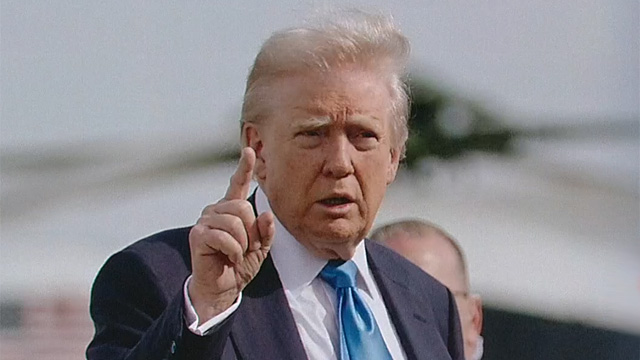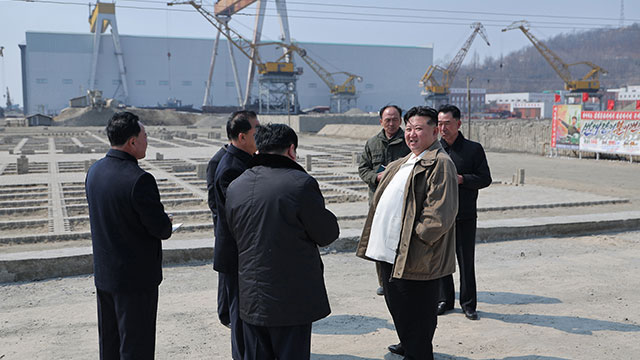[Anchor]
The United States and South Korea have agreed to set four discussion topics in their first tariff negotiations and aim for a comprehensive agreement by early July.
This is referred to as a package deal.
We will now go to a report from correspondent Kim Ji-sook and connect to Washington.
[Report]
The first ministerial meeting for tariff negotiations focused primarily on establishing a basic framework for future discussions.
The two countries agreed to discuss four topics: tariffs, non-tariff barriers, economic security, investment cooperation, and exchange rate policies.
Based on this, they will attempt a comprehensive agreement covering overall economic and trade issues by early July.
The government has stated that it will not rush before the early July deadline for tariff exemptions.
[Choi Sang-mok/Deputy Prime Minister: "I explained that there are various considerations in future negotiations, such as South Korea's political schedule, trade-related legislation, and the need for cooperation with the National Assembly, and requested the U.S. side's understanding on this."]
The government conveyed the concerns of the South Korean people regarding the 25% reciprocal tariffs imposed on South Korea and the tariffs on key export items, particularly automobiles, to the U.S. side.
Emphasizing the need for tariff exemptions and exceptions for South Korea, they also proposed ways for South Korea to contribute in the shipbuilding and energy sectors, which President Trump is interested in.
[Ahn Duk-geun/Minister of Trade, Industry and Energy: "We reiterated our request for the exemption of all tariffs on various items and any tariffs that may be imposed in the future."]
There was no mention from the U.S. side regarding the defense cost-sharing for U.S. troops in South Korea during this negotiation.
Sensitive issues for our side, such as references to China, the renegotiation of the Korea-U.S. FTA, and the expansion of beef imports, were also not brought up.
However, it is observed that the real negotiations are just beginning, and U.S. demands are expected to intensify moving forward.
[Anchor]
Now, let's go to Washington.
Correspondent Kim Ji-sook, the U.S. government has shown a positive response to the results of this first negotiation, right?
[Reporter]
The focus was on President Trump's response.
But he did not provide any direct comments.
Treasury Secretary Bessent, who participated in the negotiations, explained that they had a very successful bilateral meeting with South Korea.
[Scott Bessent/U.S. Treasury Secretary: "They came with their A game and we will see if they follow through on that."]
It is noteworthy that the U.S. Secretary referred to our government's proposal as "A game."
He also mentioned that the negotiations could progress quickly and that an agreement on the memorandum could be reached next week.
This contrasts with our position of not rushing.
From the U.S. perspective, with the 100-day mark of the administration approaching, it seems there is an intention to promote some achievements domestically, suggesting that things are going well.
[Anchor]
What we were concerned about was linking defense costs with tariffs, but there was no mention of that this time.
What could be the reason?
[Reporter]
The U.S. has consistently emphasized the defense cost issue, and President Trump recently mentioned a preference for "one-stop shopping" in a call with Acting President Han Duck-soo.
This was interpreted as a desire to put all desired issues on the negotiation table for a comprehensive negotiation, but today, President Trump stated that he would not address military issues in the tariff negotiations.
However, just last week, he directly pointed out that the costs for U.S. troops stationed in Japan were too low during negotiations with Japan.
There is always the possibility of changing positions depending on the negotiations.
And after tariff issues are resolved to some extent, the U.S. may focus on defense costs, so we cannot be entirely reassured.
This has been from Washington.
The United States and South Korea have agreed to set four discussion topics in their first tariff negotiations and aim for a comprehensive agreement by early July.
This is referred to as a package deal.
We will now go to a report from correspondent Kim Ji-sook and connect to Washington.
[Report]
The first ministerial meeting for tariff negotiations focused primarily on establishing a basic framework for future discussions.
The two countries agreed to discuss four topics: tariffs, non-tariff barriers, economic security, investment cooperation, and exchange rate policies.
Based on this, they will attempt a comprehensive agreement covering overall economic and trade issues by early July.
The government has stated that it will not rush before the early July deadline for tariff exemptions.
[Choi Sang-mok/Deputy Prime Minister: "I explained that there are various considerations in future negotiations, such as South Korea's political schedule, trade-related legislation, and the need for cooperation with the National Assembly, and requested the U.S. side's understanding on this."]
The government conveyed the concerns of the South Korean people regarding the 25% reciprocal tariffs imposed on South Korea and the tariffs on key export items, particularly automobiles, to the U.S. side.
Emphasizing the need for tariff exemptions and exceptions for South Korea, they also proposed ways for South Korea to contribute in the shipbuilding and energy sectors, which President Trump is interested in.
[Ahn Duk-geun/Minister of Trade, Industry and Energy: "We reiterated our request for the exemption of all tariffs on various items and any tariffs that may be imposed in the future."]
There was no mention from the U.S. side regarding the defense cost-sharing for U.S. troops in South Korea during this negotiation.
Sensitive issues for our side, such as references to China, the renegotiation of the Korea-U.S. FTA, and the expansion of beef imports, were also not brought up.
However, it is observed that the real negotiations are just beginning, and U.S. demands are expected to intensify moving forward.
[Anchor]
Now, let's go to Washington.
Correspondent Kim Ji-sook, the U.S. government has shown a positive response to the results of this first negotiation, right?
[Reporter]
The focus was on President Trump's response.
But he did not provide any direct comments.
Treasury Secretary Bessent, who participated in the negotiations, explained that they had a very successful bilateral meeting with South Korea.
[Scott Bessent/U.S. Treasury Secretary: "They came with their A game and we will see if they follow through on that."]
It is noteworthy that the U.S. Secretary referred to our government's proposal as "A game."
He also mentioned that the negotiations could progress quickly and that an agreement on the memorandum could be reached next week.
This contrasts with our position of not rushing.
From the U.S. perspective, with the 100-day mark of the administration approaching, it seems there is an intention to promote some achievements domestically, suggesting that things are going well.
[Anchor]
What we were concerned about was linking defense costs with tariffs, but there was no mention of that this time.
What could be the reason?
[Reporter]
The U.S. has consistently emphasized the defense cost issue, and President Trump recently mentioned a preference for "one-stop shopping" in a call with Acting President Han Duck-soo.
This was interpreted as a desire to put all desired issues on the negotiation table for a comprehensive negotiation, but today, President Trump stated that he would not address military issues in the tariff negotiations.
However, just last week, he directly pointed out that the costs for U.S. troops stationed in Japan were too low during negotiations with Japan.
There is always the possibility of changing positions depending on the negotiations.
And after tariff issues are resolved to some extent, the U.S. may focus on defense costs, so we cannot be entirely reassured.
This has been from Washington.
■ 제보하기
▷ 카카오톡 : 'KBS제보' 검색, 채널 추가
▷ 전화 : 02-781-1234, 4444
▷ 이메일 : kbs1234@kbs.co.kr
▷ 유튜브, 네이버, 카카오에서도 KBS뉴스를 구독해주세요!
- U.S., S. Korea begin tariff talks
-
- 입력 2025-04-25 23:44:30

[Anchor]
The United States and South Korea have agreed to set four discussion topics in their first tariff negotiations and aim for a comprehensive agreement by early July.
This is referred to as a package deal.
We will now go to a report from correspondent Kim Ji-sook and connect to Washington.
[Report]
The first ministerial meeting for tariff negotiations focused primarily on establishing a basic framework for future discussions.
The two countries agreed to discuss four topics: tariffs, non-tariff barriers, economic security, investment cooperation, and exchange rate policies.
Based on this, they will attempt a comprehensive agreement covering overall economic and trade issues by early July.
The government has stated that it will not rush before the early July deadline for tariff exemptions.
[Choi Sang-mok/Deputy Prime Minister: "I explained that there are various considerations in future negotiations, such as South Korea's political schedule, trade-related legislation, and the need for cooperation with the National Assembly, and requested the U.S. side's understanding on this."]
The government conveyed the concerns of the South Korean people regarding the 25% reciprocal tariffs imposed on South Korea and the tariffs on key export items, particularly automobiles, to the U.S. side.
Emphasizing the need for tariff exemptions and exceptions for South Korea, they also proposed ways for South Korea to contribute in the shipbuilding and energy sectors, which President Trump is interested in.
[Ahn Duk-geun/Minister of Trade, Industry and Energy: "We reiterated our request for the exemption of all tariffs on various items and any tariffs that may be imposed in the future."]
There was no mention from the U.S. side regarding the defense cost-sharing for U.S. troops in South Korea during this negotiation.
Sensitive issues for our side, such as references to China, the renegotiation of the Korea-U.S. FTA, and the expansion of beef imports, were also not brought up.
However, it is observed that the real negotiations are just beginning, and U.S. demands are expected to intensify moving forward.
[Anchor]
Now, let's go to Washington.
Correspondent Kim Ji-sook, the U.S. government has shown a positive response to the results of this first negotiation, right?
[Reporter]
The focus was on President Trump's response.
But he did not provide any direct comments.
Treasury Secretary Bessent, who participated in the negotiations, explained that they had a very successful bilateral meeting with South Korea.
[Scott Bessent/U.S. Treasury Secretary: "They came with their A game and we will see if they follow through on that."]
It is noteworthy that the U.S. Secretary referred to our government's proposal as "A game."
He also mentioned that the negotiations could progress quickly and that an agreement on the memorandum could be reached next week.
This contrasts with our position of not rushing.
From the U.S. perspective, with the 100-day mark of the administration approaching, it seems there is an intention to promote some achievements domestically, suggesting that things are going well.
[Anchor]
What we were concerned about was linking defense costs with tariffs, but there was no mention of that this time.
What could be the reason?
[Reporter]
The U.S. has consistently emphasized the defense cost issue, and President Trump recently mentioned a preference for "one-stop shopping" in a call with Acting President Han Duck-soo.
This was interpreted as a desire to put all desired issues on the negotiation table for a comprehensive negotiation, but today, President Trump stated that he would not address military issues in the tariff negotiations.
However, just last week, he directly pointed out that the costs for U.S. troops stationed in Japan were too low during negotiations with Japan.
There is always the possibility of changing positions depending on the negotiations.
And after tariff issues are resolved to some extent, the U.S. may focus on defense costs, so we cannot be entirely reassured.
This has been from Washington.
The United States and South Korea have agreed to set four discussion topics in their first tariff negotiations and aim for a comprehensive agreement by early July.
This is referred to as a package deal.
We will now go to a report from correspondent Kim Ji-sook and connect to Washington.
[Report]
The first ministerial meeting for tariff negotiations focused primarily on establishing a basic framework for future discussions.
The two countries agreed to discuss four topics: tariffs, non-tariff barriers, economic security, investment cooperation, and exchange rate policies.
Based on this, they will attempt a comprehensive agreement covering overall economic and trade issues by early July.
The government has stated that it will not rush before the early July deadline for tariff exemptions.
[Choi Sang-mok/Deputy Prime Minister: "I explained that there are various considerations in future negotiations, such as South Korea's political schedule, trade-related legislation, and the need for cooperation with the National Assembly, and requested the U.S. side's understanding on this."]
The government conveyed the concerns of the South Korean people regarding the 25% reciprocal tariffs imposed on South Korea and the tariffs on key export items, particularly automobiles, to the U.S. side.
Emphasizing the need for tariff exemptions and exceptions for South Korea, they also proposed ways for South Korea to contribute in the shipbuilding and energy sectors, which President Trump is interested in.
[Ahn Duk-geun/Minister of Trade, Industry and Energy: "We reiterated our request for the exemption of all tariffs on various items and any tariffs that may be imposed in the future."]
There was no mention from the U.S. side regarding the defense cost-sharing for U.S. troops in South Korea during this negotiation.
Sensitive issues for our side, such as references to China, the renegotiation of the Korea-U.S. FTA, and the expansion of beef imports, were also not brought up.
However, it is observed that the real negotiations are just beginning, and U.S. demands are expected to intensify moving forward.
[Anchor]
Now, let's go to Washington.
Correspondent Kim Ji-sook, the U.S. government has shown a positive response to the results of this first negotiation, right?
[Reporter]
The focus was on President Trump's response.
But he did not provide any direct comments.
Treasury Secretary Bessent, who participated in the negotiations, explained that they had a very successful bilateral meeting with South Korea.
[Scott Bessent/U.S. Treasury Secretary: "They came with their A game and we will see if they follow through on that."]
It is noteworthy that the U.S. Secretary referred to our government's proposal as "A game."
He also mentioned that the negotiations could progress quickly and that an agreement on the memorandum could be reached next week.
This contrasts with our position of not rushing.
From the U.S. perspective, with the 100-day mark of the administration approaching, it seems there is an intention to promote some achievements domestically, suggesting that things are going well.
[Anchor]
What we were concerned about was linking defense costs with tariffs, but there was no mention of that this time.
What could be the reason?
[Reporter]
The U.S. has consistently emphasized the defense cost issue, and President Trump recently mentioned a preference for "one-stop shopping" in a call with Acting President Han Duck-soo.
This was interpreted as a desire to put all desired issues on the negotiation table for a comprehensive negotiation, but today, President Trump stated that he would not address military issues in the tariff negotiations.
However, just last week, he directly pointed out that the costs for U.S. troops stationed in Japan were too low during negotiations with Japan.
There is always the possibility of changing positions depending on the negotiations.
And after tariff issues are resolved to some extent, the U.S. may focus on defense costs, so we cannot be entirely reassured.
This has been from Washington.
-
-

김지숙 기자 jskim84@kbs.co.kr
김지숙 기자의 기사 모음
-
이 기사가 좋으셨다면
-
좋아요
0
-
응원해요
0
-
후속 원해요
0















이 기사에 대한 의견을 남겨주세요.